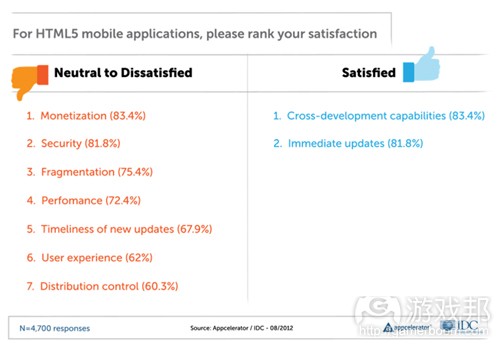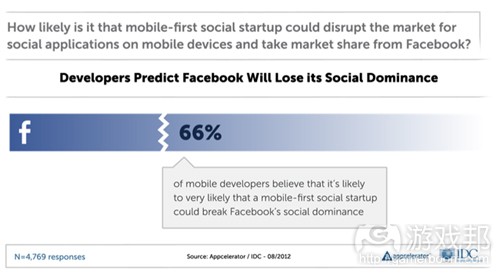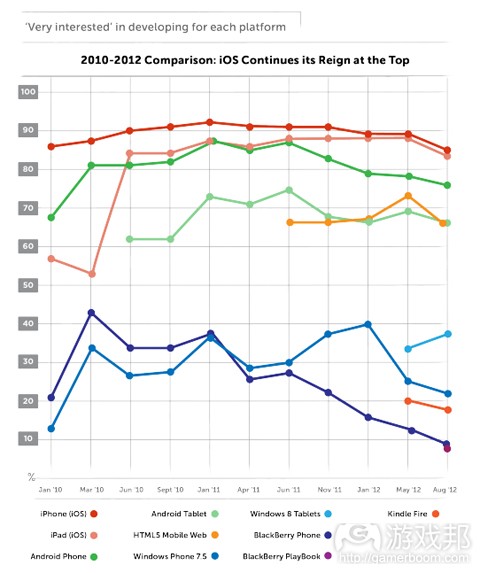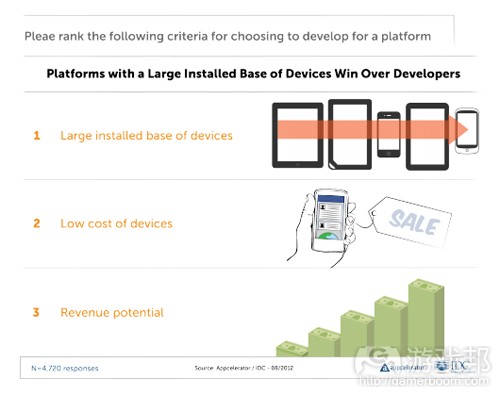每日观察:关注开发者对HTML5支持率走低(9.26)
1)手机应用开发平台供应商Appcelerator最新报告指出,HTML5不尽人意的用户体验导致不少应用开发者对其望而却步。
Appcelerator在今年第三季度调查了5000多名客户,发现将近60%客户曾尝试使用HTML5,但很快就因技术问题而放弃。这些开发者表示,他们无法从使用HTML5顺利解决UI、安全性及发布渠道等方面的问题。
这些对HTML5不满或漠不关心的开发者表示,盈利性是HTML5的最大软肋(持这一观点的开发者占比83.4%),安全性位居其次(81.8%),然后就是分裂性(75.4%)。
这些开发者对Facebook的移动战略也表示失望,66%受访者称Facebook最近宣布放弃对HTML5的关注,很可能也是出于同样的原因。此外,Facebook早期分别开发iOS、Android和移动网页应用的策略也让开发者对该公司产生不良印象。有66%开发者认为Facebook在移动领域将丧失其社交优势。
Appcelerator这项调查报告还显示,iOS平台由于盈利性较高,因而其开发者支持率依旧远超Android平台。
苹果iPad的开发者支持幅度大于iPhone(苹果曾指出iPad在4-6月间占据了68%的平板电脑市场份额)。但值得注意的是,这些开发者表示他们针对某个平台创建内容的首要考虑因素却是“设备安装基础”,虽然目前尚无相关移动设备的准确安装数据,但Android高管Andy Rubin已指出Android设备激活量已达5亿,而苹果iOS设备总销量则是4亿部,从这一点就能推测出哪个平台更有用户基础。
多数开发者认为智能电视是下一个最有潜力的平台,有83.5%开发者有意在2015年针对该设备开发内容。
2)在线广告网络Chitika最近报告显示,多数iOS和Android用户选择使用移动设备上的默认浏览器,但也有一些用户会在智能手机、平板电脑下载一些其他浏览器(游戏邦注:其调查范围美国和加拿大移动网络流量,其中包括Chitika网络广告印象,调查时间为8月28日至9月4日)。
相对Android用户,iOS用户更常下载替代性浏览器。从基于广告印象的浏览器使用率来看,选择Safari的iOS有户占比85.03%,Chrome占比3.07%,而其他浏览器(例如Dolphin、Atomic、Mercury等)占比11.9%。
Android用户选择内置Android浏览器者占比91.26%,Opera占比5.83%,谷歌Chrome浏览器占比2.34%,火狐占比0.56%。
3)据games.com报道,EA Playfish计划在芬兰赫尔辛基成立新工作室,从该公司在LinkedIn发布的招聘信息可以看出,这家工作室正在招聘软件工程师等成员,并将专注于开发新IP或现有游戏的更多内容。
有消息称,Digital Chocolate最近也进驻芬兰市场,这一迹象表明将有许多社交游戏开发商有意借该市场的游戏制作氛围获得发展。
4)据games.com报道,孩之宝公司日前发布了自己推出的大富翁社交游戏《Monopoly Millionaire Mansions》,它并非一款正式的Facebook游戏,但采用了Facebook Connect功能,并支持玩家使用Google Maps体验这款基于地理定位的游戏。
玩家接入Facebook之后,可以选择一个永久的现实地理位置并建设自己梦想中的豪宅,然后升级解琐新建筑以及丰富的道具来装饰豪宅。例如,当玩家升级到百万富翁的级别时,就可以拥有三橦奢华的豪宅。
5)据insidesocialgames报道,华纳兄弟互动娱乐与Kabam日前宣布将联合发行基于彼得·杰克逊电影《霍比特人》三部曲的手机及网页游戏。
Kabam将负责开发和维护两款战略游戏(一个是手机游戏,一个是网页游戏),其中手机版游戏是《The Hobbit: Kingdoms of Middle-earth》,而网页版本则是《The Hobbit: Armies of the Third Age》。这两者都将于今年秋季发布,将于9月25日开放测试服务。
Kabam现在已不再是依赖于单个平台的公司,目前正考虑在2013或2014年进行IPO。
6)据Techcrunch报道,谷歌最近发布了新版Chrome,添加了Pointer Lock JavaScript API。这个API的用途很简单:支持3D游戏在浏览器上的运行。开发者可利用这一API解决鼠标总是游离于游戏窗口之外的问题,方便用户“用鼠标自然地控制自己的视野,而无需游离于窗口之外或者撞到屏幕边缘”。
谷歌还指出,除了游戏之外,“医疗与科学可视化、培训、模拟、建模、程序编写包装”以及类似的网页应用也可从这一API受益。(本文为游戏邦/gamerboom.com编译,拒绝任何不保留版权的转载,如需转载请联系:游戏邦)
1)Appcelerator: developers disappointed with HTML5, Facebook’s mobile strategy
Kathleen De Vere
Unsatisfactory experiences are turning mobile app developers off HTML5 and away from Facebook reports Appcelerator.
The mobile app development platform provider polled over 5,000 of its customers for its Q3 2012 Mobile Developer report. According to Appcelerator principle mobile strategist Mike KIng, almost 60 percent of his company’s customers have tried working with HTML5, but technical issues are quickly souring feelings towards the platform.
“We get a lot of our customers come to us after they try and do something in HTML5 and they say they just can’t accomplish the things that they need to do from an application perspective — whether it be UI, security or distribution — with HTML5,” says King.
Appcelerator’s customers ranked themselves as neutral to dissatisfied with HTML5’s performance on seven out of nine standard development platform features. The least popular feature was monetization, with 83.4 percent of developers indicating they were either neutral or dissatisfied with HTML5’s performance, followed by security (81.8 percent either neutral or dissatisfied), then fragmentation (75.4 percent neutral or dissatisfied).
Appcelerator developers were also disappointed with Facebook’s mobile strategy. 66 percent of those polled believe the company — which recently backed away from its HTML5-focused mobile strategy in favor of native app development, likely due to the same problems Appcelerator developers identified with the platform — is at risk of disruption from a mobile-centric social network.
“The majority of developers feel that Facebook has not done a good job at interfacing with them, enabling them or giving them tools,” explains King. “They need to have a much more prescriptive engagement model with developers. They can’t just do what they’ve done in the past, which is say ‘here’s the graph, have at it!’ That doesn’t give developers meaningful ways to interact with the social graph — that’s just a library of APIs.”
According to King, Facebook’s has made a misstep with its mobile strategy so far, which has been centered around making a smaller version of the Facebook website to mobile via an HTML5-based app. “If you think about it, you’re going to access Facebook more frequently on your mobile device than you will on your home computer. If the frequency of interaction is higher, you want to make sure that interaction is rich, compelling and contextual,” he says. Facebook’s earlier decisions to develop its iOS, Android and mobile web apps differently have also negatively impacted developer’s opinions of the company.
Facebook has made strides to improve its mobile experience recently, ditching HTML5 when it upgraded its iOS app to version 5.0 and committing to an accelerated Android app development schedule, but it appears both shareholders and developers are still dubious about the company’s mobile expertise.(source:insidemobileapps)
Android Developer Interest Declines For A Fourth Quarter, Survey Shows
Kim-Mai Cutler
Even as Android has blown past iOS in terms of total device activations versus Apple’s cumulative device sales, developers still remain more interested in building for iOS, Appcelerator found in a survey of more than 5,500 developers. This could be either because Apple’s iOS continues to monetize better than Android or because there is a lag time. It may take many more months (or years) before developers adjust to understanding that Android likely has a larger active installed base of devices. The Blackberry platform showed a far more precipitous decline, but the reasons for that are far less puzzling.
Appcelerator found that the platform features developers were most interested in included Apple Maps (hah!), followed by the mobile wallet Passbook and then standard upgrades like a faster processor.
Naturally, Apple holds a much stronger lead in the tablet category with the iPad, than it does in smartphones. Apple said it had 68 percent market share from April through June in the tablet category, during the iPhone 5 launch event.
The irony of the split between Android and iOS developer interest is that developers told Appcelerator that the most important factor for them in determining which platform to build for is having a “large installed base of devices.” While no one knows the exact active installed base of devices, the number of daily active users that Facebook’s Android app sees recently surpassed Facebook’s iOS app. On top of that, Android head Andy Rubin said that the platform had seen 500 million activations, while Apple last said it had seen 400 million in cumulative device sales.
As for cross-platform development, developers remain deeply dissatisfied with HTML5 — mostly because of monetization and security issues. And it looks like those won’t be solved anytime soon, especially given that Facebook has now reversed course and is shifting away from HTML5 toward native development. With nearly 1 billion users and a rich ecosystem of developers, they would have been one of the companies that would have been most able to support payments and monetization on the web. Apple, Amazon and Google, meanwhile, are all putting resources behind their own app stores.
Speaking of Facebook, two-thirds of developers think that a mobile-first startup could disrupt the social networking company’s hold on the entire marketplace. One big piece of evidence in support of this has been Instagram’s quick run to accumulate more than 100 million users, attracting enough momentum to force Facebook’s hand with a near $1 billion acquisition.
Facebook CEO Mark Zuckerberg really tried to emphasize how mobile has become the company’s top priority at TechCrunch Disrupt earlier this month. He said in the last six months, the company had overhauled its native applications, added a mobile revenue stream in the form of advertising and launched a deep integration into iOS6 with Apple. Yet that may not be enough.
Perhaps it’s only a matter of time before someone emerges that won’t cave in the face of a $1 billion offer (not unlike how Zuckerberg turned down Yahoo five years ago).
Lastly, developers see smart TVs as the most likely candidate for the next big platform, followed by connected cars and then game consoles. Wearable computing, like Google Glass, comes in at fifth place with two-thirds of developers saying they’d be willing to build apps for by 2015.(source:techcrunch)
2)Chitika: Most smartphone and tablet owners use default browsers, iOS users more likely to download alternatives
Scott Reyburn
The majority of mobile users for both the iOS and Android operating systems lean toward using the default browser on their devices, according to a new study today from Chitika, although some smartphone and tablet owners have downloaded alternative browsers.
Chitika reported that while most mobile owners use their default browser, iOS owners were more likely to download alternatives than Android owners.
Online advertising network’s Chitika Insights team analyzed a sample of their web traffic from the U.S. and Canada, which included online impressions from its advertising network, between Aug. 28 to Sept. 4.
Browser distribution based on ad impressions for iOS broke down with Safari at an 85.03 percent share, Chrome at 3.07 percent and other browsers — e.g. Dolphin, Atomic, Mercury and more — at 11.90 percent. Android’s browser distribution had the built-in Android browser with a 91.26 percent share, Opera with 5.83 percent, Google’s own Chrome browser with 2.34 percent and Firefox with 0.56 percent.(source:insidemobileapps)
3)EA to open Playfish social games studio in Helsinki, Finland [Report]
by Joe Osborne
Likely in pursuit of the angriest of birds and great house music, it looks as if EA intends to open a studio for social game arm Playfish in Helsinki, Finland. According to LinkedIn job postings, the publisher is in need of software engineers, but there are plenty more open positions where that came from. Here’s the word from EA found on one of its job postings:
“Playfish has offices in London, San Francisco, Montreal, Tokyo, and Beijing and now Helsinki, Finland. Playfish Finland is a new studio, and we’re searching for a Senior Server Side Java Software Engineer to join our team,” a posting reads. Later, the posting mentions this: “The engineer will work as part of a game team to create and refine game server frameworks.”
Based on this wording, Playfish Finland will focus on either development of new properties or more content for existing games. Let’s hope for the former … unless you’re still digging on The Sims Social or SimCity Social big time. What with Digital Chocolate recently opening up shop in Finland, the home of Angry Birds maker Rovio, it seems as if more social game makers hope to feed off of those good game-making vibes. We’ve reached out to EA for comment (and to hopefully find out what they’re up to).(source:games)
4)Monopoly Millionaire Mansions is Hasbro’s take on Facebook games
by Joe Osborne
Don’t worry, you won’t need any fake paper money for this one. Hasbro has launched it’s own Facebook game based on one of the most popular board games of all time, Monopoly Millionaire Mansions. While not officially a Facebook game, it uses Facebook Connect to, well, connect players with one another in a location based game of keeping up with the Joneses using Google Maps.
After connecting with Facebook, players begin by choosing a permanent, real-life location on which to build the mansion of their dreams. (This is first come, first serve, folks–so hurry up.) Then it’s time to choose a type of mansion and begin leveling up toward unlocking new mansions and more lavish items to decorate said mansion.
On the way to the top, players will answer trivia questions and visit other mansions to earn as many points as possible. When players reach the level of Monopoly Millionaire, they can own up to three gorgeous mansions. According to Mashable, players can build on 203 billion plots of land with 22 different mansion designs and 74 luxurious accessories. There’s quite a bit of muscle behind this crack at making Monopoly work on the web.(source:games)
5)Warner Bros. forms fellowship with Kabam for Hobbit games
Mike Thompson
Warner Bros. Interactive Entertainment and Kabam have joined forces to co-publish mobile and web games based on Peter Jackson’s upcoming Hobbit film trilogy.
Kabam is set to develop and maintain two strategy titles, one mobile and one online. Mobile devices will receive The Hobbit: Kingdoms of Middle-earth, while The Hobbit: Armies of the Third Age will be playable on web browsers. Both games are scheduled to launch this Fall and players will be able to sign up for the latter game’s beta starting on Sept. 25.
Warner Bros. Interactive Entertainment has been largely absent from social and mobile platforms, though the studio has developed a few light tie-ins to some of its movies and mobile versions of popular franchises. While there have been a number of mobile games based on its parent company’s more popular IP, these tend to be licensed titles developed by third parties like Gameloft. Kabam, however, has managed to successfully leverage itself as a core game developer, with only 30 percent of its income coming from Facebook. The majority of its revenue now comes from its own web platform and mobile and tablet games. Recently, the company scored a major hit with Kingdoms of Camelot: Battle for the North on iOS.
Now that it’s clearing revenue of $100 million and isn’t dependent on one platform, the company is now considering an IPO but hasn’t said whether that will happen in 2013 or 2014.(source:insidesocialgames)
6)Chrome Becomes A Better 3D Gaming Platform, Now Supports Pointer Lock
Frederic Lardinois
Google just launched a new stable version of Chrome today that adds supports for the Pointer Lock JavaScript API. The purpose of this API is pretty simple: in 3D games on the browser, for example, the mouse often moves outside of the window, which effectively makes playing the game impossible. With the Pointer Lock API, which is currently working its way through the standardization process, developers can restrict mouse movements to the inside of the window. This, says Google, allows users “to control their perspective naturally with the mouse, without moving outside the window or bumping into the edge of their screen.”
Google stresses that it’s not just games that profit from this API, though. “Medical and scientific visualization, training, simulation, modeling, authoring packages” and similar highly graphical web apps will also be able to make good use of this feature.(source:techcrunch)

















































 闽公网安备35020302001549号
闽公网安备35020302001549号